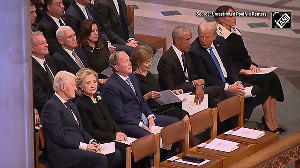 The Competition Commission of India (CCI) on Monday slapped a penalty of Rs 2,545 crore (Rs 25.45 billion) on 14 top carmakers of the country for violating trade norms in the spare-part andafter-sale service market.
The Competition Commission of India (CCI) on Monday slapped a penalty of Rs 2,545 crore (Rs 25.45 billion) on 14 top carmakers of the country for violating trade norms in the spare-part andafter-sale service market.
The companies penalised by the competition watchdog were Maruti Suzuki, Tata Motors, Honda Siel Cars India, Volkswagen India, Fiat India, BMW India, Ford India, General Motors India, Hindustan Motors, Mahindra & Mahindra, Mercedes-BenzIndia, Nissan Motor India, Skoda Auto India and Toyota Kirloskar Motor.
The penalty - two per cent of these companies' average turnover in the past three years - will have to be deposited within 60 days of receipt of the order.
When contacted by Business Standard, Maruti, Honda, Tata and Hyundai declined to comment on the order. Others could not be reached.
A detailed investigation by the competition watchdog had revealed these carmakers violated rules with respect to agreements with local original equipment suppliers, as well as pacts with authorised dealers.
Through these agreements, the carmakers "imposed absolute restrictive covenants and completely foreclosed the after-sale market for supply of spare parts and other diagnostic tools", the order said.CCI also found that these companies, big players in the after-sale market for their respective brands, abused their dominant position and affected 20 million consumers.
"The 14 car companies were found to be indulging in practices that led to denial of market access to independent repairers, as the latter were not provided access to branded spare parts and diagnostic tools which hampered their ability to provide services in the after-sale market for repair and maintenance of cars," the order said.
The fair-trade regulator also directed the carmakers to "cease and desist" from anti-competitive practices.
At present, component makers are free to sell some parts to the after-sale market, especially those going under the hood, such as piston rings. But they are not allowed to sell parts that are visibly different for each model and have been developed jointly with the carmaker, such as head lights, tail lights, bumpers, etc. In this scenario, the procurement cost for independent multi-brand service providers is high, as they can source spares only from independent dealers, and not from the original equipment suppliers.
Industry sources say the CCI order will not only bring down servicing costs for vehicles but help curtail the use of counterfeit components in workshops.
According to industry estimates, nearly 50 per cent of car owners move away from authorised dealerships upon expiry of warranty due to higher servicing costs.
"Servicing expenses at company-operated service outlets are 30-40 per cent higher than those at independent and unorganised workshops. As margins get squeezed due to discounts on new vehicles, dealers resort to increasing servicing costs to make up for the lost profits," said an industry executive who did not wish to be named.
Automobile makers insert strict clauses in supply contracts with component makers to sell spares exclusively to company-authorised dealerships. Dealers subsequently share with carmakers the profits on sales of these spares.
"It is a vicious cycle. Every customer a neighbourhood garage gets is one lost by the dealer. Companies restrict supplies of components to run these workmen out of business. The unorganised sector either buys spares from the grey market or uses counterfeit items to retain business," the executive added. The numbers are alarming. Estimates, according to a study by the auto component industry, suggests nearly 35 per cent of spares in the Rs 33,000-crore after-sale service market are counterfeit products.
The loss to the exchequer due to lower realisation of indirect taxes on sales of spurious components stands at about Rs 2,200 crore (Rs 22 billion) a year. More significant is the loss to life and limb that takes place due to fake components fitted on to vehicles in the unorganised repair industry.
One of every five road accidents in India can be attributed to the use of counterfeit automotive parts.An added disadvantage of using counterfeit parts is the increase in fuel consumption. It is estimated that nearly 109 million litres of additional petrol and eight million litres of additional diesel are consumed due to use of spurious parts. In value terms, this translates into a loss of Rs 600 crore (Rs 6 billion) a year.
Another industry source said: "The margins on spares sold through authorised dealerships are often as high as 100 per cent. If you can make good-quality original components available at affordable prices, why will a customer not opt for these products? Besides the issue of safety, it enhances fuel efficiency and the overall experience of a vehicle."
CCI was pursuing the case under Sections 3 and 4 of the Competition Act which, respectively, relate with involvement in anti-competitive practices and the abuse of dominant position by enterprises. The probe was conducted after a complaint (filed in 2011) alleged certain carmakers were abusing their dominant market position to sell spares only through authorised dealers.












 © 2025
© 2025